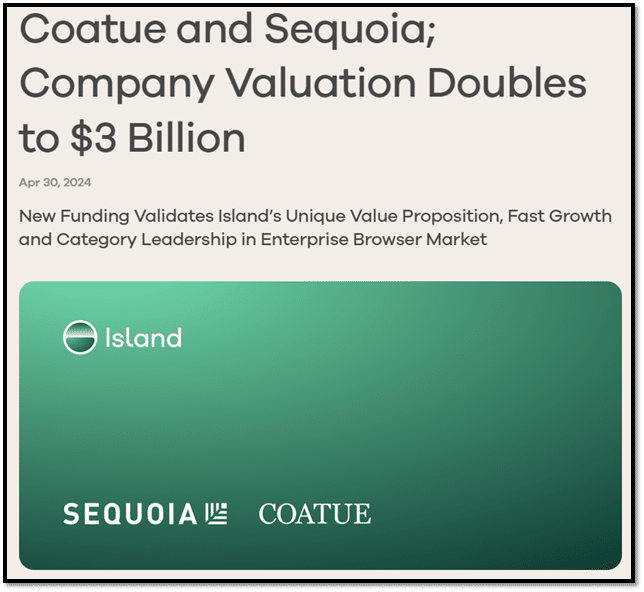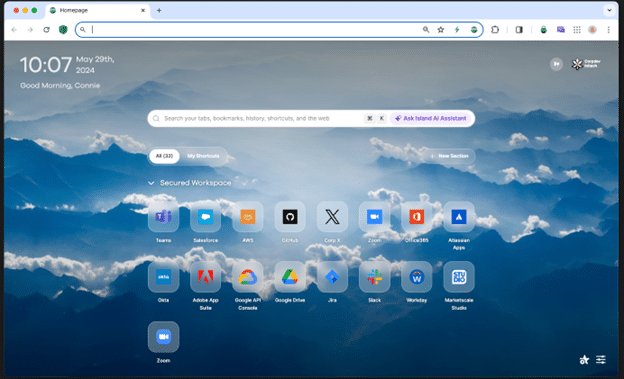The enterprise browser is among the hottest new categories emerging in the EUC space. These are NOT rehashed consumer browsers such as Chrome, Edge, or Firefox; they are browsers with enterprise features designed to meet businesses’ needs. They focus on security, manageability, and integration with enterprise tools and workflows.
The enterprise browser is among the hottest new categories emerging in the EUC space. These are NOT rehashed consumer browsers such as Chrome, Edge, or Firefox; they are browsers with enterprise features designed to meet businesses’ needs. They focus on security, manageability, and integration with enterprise tools and workflows.
Enterprise browsers are receiving considerable attention from users, investors, and venture capital firms. To highlight this one of the originators in this category, Island, recently received a $175 million round of level D funding, raising the company’s valuation to an eye-popping $3 billion!
To get a better handle on this new category Brian Beeler and I recently spoke with Jason Trunk and Ellen Roeckl of Island. Jason is an Enterprise Architect at Island, and Ellen is Island’s Chief Communications Officer.
We first asked Jason to explain this category and then asked him why Island is seen as one of the leaders in it.
What are Enterprise Browsers?
Jason began by describing enterprise browsers, particularly Island’s offering, Enterprise browsers are not your run-of-the-mill web browsers but specialized tools designed to enhance security, control, and productivity for organizations. Unlike standard consumer browsers, enterprise browsers like Island are tailor-made to address the specific needs of businesses, with a strong emphasis on security, compliance, and manageability. Island is built on a highly customized version of the Chromium code to ensure maximum compatibility with existing SaaS applications and websites.
Jason went into the critical features of an enterprise browser. He emphasized that, unlike standard consumer browsers, enterprise browsers focus on security, compliance, and manageability to meet the specific needs of businesses. These browsers offer features like isolation and containment to prevent malware and other security threats from compromising a companies network and the devices on it. He keyed in on Island’s, data loss prevention (DLP) capabilities which prevents sensitive data from being inadvertently or maliciously shared outside the organization by monitoring and controlling data flows. He stressed that enterprise browsers should be part of any company’s existing security solutions to provide it with a comprehensive security position.
Island Enterprise Browser Benefits
He also stressed that centralized management and control are essential components for enterprise browsers. With Island, IT administrators use a portal to enforce browsing policies across the organization, such as restricting access to certain websites or types of content. From this portal, they can remotely configure browser settings and push updates without user intervention. Detailed logging and monitoring of user activity ensure compliance with corporate policies and regulations.
Island offers fine-grained control over what users can do within the browser, such as downloading, copying, or capturing screen content. It protects against web-based threats, including phishing and malicious websites, and has mechanisms to prevent unauthorized sharing or leakage of sensitive information. Additionally, Island provides comprehensive insights into browser usage and potential security incidents while maintaining a user-friendly experience similar to traditional browsers but with enterprise-grade security features. Overall, enterprise browsers like Island are crucial tools for organizations aiming to enhance their cybersecurity posture while maintaining user productivity and compliance with regulatory requirements.
Regarding productivity and compliance, the Islands browser supports single sign-on (SSO), and integration with enterprise identity management systems. This streamlines the user experience while maintaining security. The browser can be customized to fit specific workflows and applications critical to the business and includes features to help organizations comply with industry regulations and standards, such as GDPR or HIPAA.
One of the most significant benefits of an enterprise browser like Island is its familiarity. It looks and behaves like any other browser, within the limits and restrictions your policies allow. This allows you to add another layer of security without changing your user’s workflows.
Final Thoughts
Considering how much work gets done from a web browser (some estimate it to be as high as 90% for some companies), it makes sense that this category of browsers is getting as much attention as it does. Hopefully, we will get a chance to spend more time in this category and spend some hands-on time with enterprise browsers, not only from the user’s perspective but also as administrators.
More information about Island and The Enterprise Browser can be found at island.io.
Engage with StorageReview
Newsletter | YouTube | Podcast iTunes/Spotify | Instagram | Twitter | TikTok | RSS Feed



